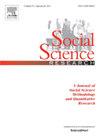Liberal economic institutions reduce relative poverty only in developed, individualist societies: A global analysis, 2000–2019
IF 3.5
2区 社会学
Q1 SOCIOLOGY
引用次数: 0
Abstract
Liberal economic institutions – such as secure property rights, modest regulation, and free international trade – seem to boost economic development, but how do they relate to relative poverty? Surprisingly, given the social salience of this question in the age of globalization, there is almost no comprehensive research using global panel data and aggregate indices of economic freedom to investigate it. We construct such a dataset with 139 countries, and present fixed-effects and dynamic-panel regressions of relative poverty on liberal economic institutions, measured with the Fraser Institute's Economic Freedom of the World (EFW) index. Our baseline finding is that over-time increases in economic freedom – especially freedom of international trade but also limited government size – predict modest decreases in relative poverty. This relationship turns out to be heterogeneous and strongly mediated by unemployment, such that economic freedom decreases unemployment, which in turn decreases relative poverty. Crucially, we find that collectivism, a cultural variable, strongly moderates the relationship between economic freedom and poverty to the extent that it becomes non-significant in societies tending toward collectivism. Concerning endogeneity, our results are shown to be quite robust to moderate levels of omitted-variable bias in formal tests, and reverse causality is not an issue. However, dynamic panel models that include lagged values of the dependent variable among regressors indicate loss of significance for some of our main results, preventing us from claiming complete robustness to endogeneity.
自由经济制度只在发达的个人主义社会减少相对贫困:2000-2019年的全球分析
自由的经济制度——比如有保障的产权、适度的监管和自由的国际贸易——似乎能促进经济发展,但它们与相对贫困有什么关系呢?令人惊讶的是,考虑到这个问题在全球化时代的社会突出性,几乎没有使用全球面板数据和经济自由综合指数来调查它的综合研究。我们构建了这样一个包含139个国家的数据集,并用弗雷泽研究所的世界经济自由指数(EFW)衡量相对贫困对自由经济制度的固定效应和动态面板回归。我们的基本发现是,随着时间的推移,经济自由度的增加——尤其是国际贸易自由度的增加,以及政府规模的限制——预示着相对贫困的适度减少。这种关系被证明是异质的,并且受到失业的强烈中介作用,因此经济自由降低了失业率,失业率反过来又降低了相对贫困。至关重要的是,我们发现集体主义,一个文化变量,强烈地调节了经济自由和贫困之间的关系,以至于它在趋向集体主义的社会中变得不重要。关于内生性,我们的结果表明,在正式测试中,对于省略变量偏差的中等水平是相当稳健的,反向因果关系不是问题。然而,在回归变量中包含因变量滞后值的动态面板模型表明,我们的一些主要结果失去了显著性,这使我们无法声称对内生性具有完全的稳健性。
本文章由计算机程序翻译,如有差异,请以英文原文为准。
求助全文
约1分钟内获得全文
求助全文
来源期刊

Social Science Research
SOCIOLOGY-
CiteScore
4.30
自引率
4.00%
发文量
0
审稿时长
65 days
期刊介绍:
Social Science Research publishes papers devoted to quantitative social science research and methodology. The journal features articles that illustrate the use of quantitative methods in the empirical solution of substantive problems, and emphasizes those concerned with issues or methods that cut across traditional disciplinary lines. Special attention is given to methods that have been used by only one particular social science discipline, but that may have application to a broader range of areas.
 求助内容:
求助内容: 应助结果提醒方式:
应助结果提醒方式:


